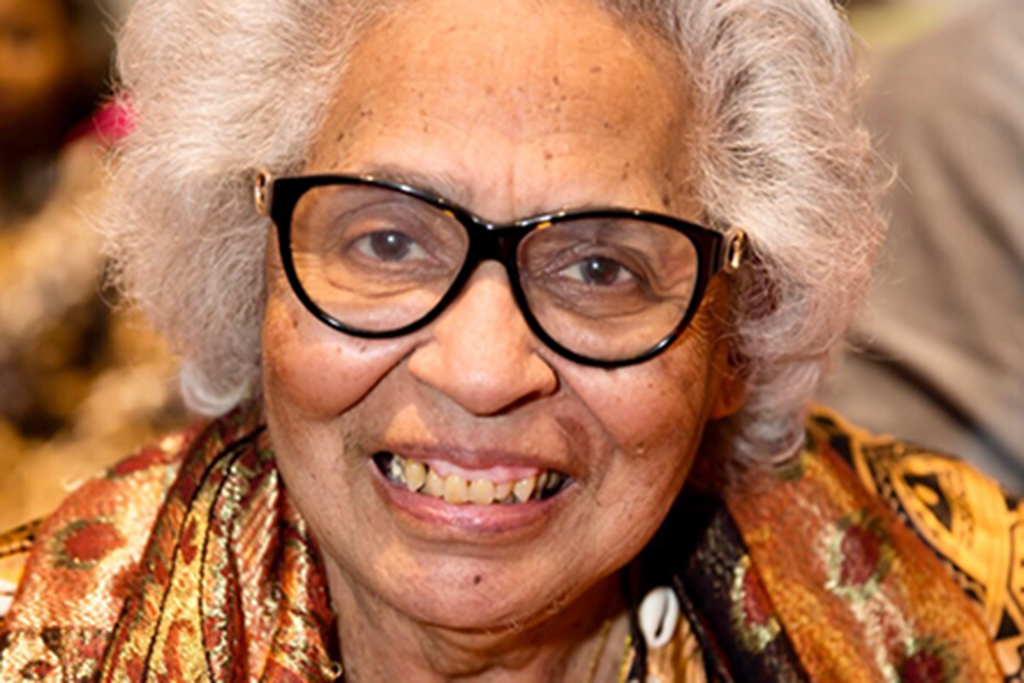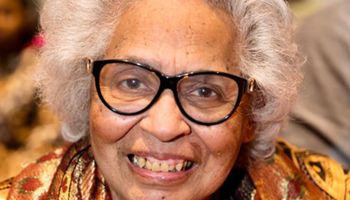
Iyaluua Ferguson. | Source: Solwazi Afi Olusola
By at least mid-February of this year, Iyaluua Ferguson, a teacher, a revolutionary and a community organizer of the first order, knew her final hours were approaching. She wasn’t fearful this 91st winter of hers. She seemed more like the hope embedded, the quest achieved in the words of the old Negro spiritual: I wanna be ready to put on my long white robe. She was ready. Iyaluua had lived a life in which she’d given far more than she’d ever taken. A life in which she knew love, revolutionary love, a life dedicated and centered upon Black self-determination and a life devoted to family.
And in the hour of her leaving, Iyaluua was lovingly being cared for by her treasured and faithful granddaughter, Karima Blaize.
Karima, the mother of four beautiful boys, came from New York to North Carolina as her own mother was dying in late 2019. She stayed, shifting her New York world for a North Carolina world after her mother passed away so that she could care for her grandmother, Iyaluua.
She ensured we knew the history of the Black Liberation Movement and the powerful role Black women played. She ensured we knew not to work in the shadows of men, but on the frontlines.
It was Karima, who at 3:00 a.m. last Tuesday, February 27, 2024, went into her grandmother’s room to administer the pain medication Iyaluua now needed.
And it was Karima who held her magnificent grandmother’s hand as she drew the final breath of her extraordinary life.
I knew Mama Iyaluua for a little bit a long time ago.
Our introduction came in 1992 when her beloved husband of more than 40 years, Baba Herman Ferguson, was released from a New York State prison, where he’d been held since 1989. In that April of his release, there were headlines and stories and rightful celebrations of a man who was a revolutionary educator, assistant high school principal and dedicated community organizer. His work to stop the building of a housing development in Queens which specifically excluded the hiring of Black people, got the attention of Malcolm X, whom he would go on to work with in the founding of Muslim Mosque No. 7 and the Organization of African American Unity. Baba Herman was a witness to the brutal assassination of Minister Malcolm on February 21, 1965, at the Audubon Ballroom in Harlem, New York.
Determined to keep Malcolm’s vision alive, Baba Herman leaned on the wisdom and support of his beloved partner and wife, Iyaluua, whom he met in 1967 at P.S. 40 in New York City. “She taught English and Spanish at the school where he served as assistant principal,” Karima Blaize offered in a generous and exclusive conversation with me while in the midst of planning her grandmother’s homegoing.
Iyaluua joined her love in Guyana, marrying Herman under the skies of a new nation.
She confirmed what was already known to us who were lucky enough to spend time with Iyaluua and Herman: that they connected in vision and then love from the very beginning. Both here in the U.S. and later in the newly independent Guyana, they worked to keep the dream of a free Black nation alive. Herman had gone into exile in South America after being set up by undercover police and wrongfully accused and convicted of conspiring to murder two civil rights leaders, Roy Wilkins and Whitney Young.
Friendly with government actors from Presidents to FBI leaders, the two were considered questionable by a number of prominent African Americans, from Paul Robeson to Daisy Bates—for good reason. Wilkins collaborated with the openly anti-Black, anti-freedom FBI head, J. Edgar Hoover. Still, while they were not considered at all friends of the Black Liberation movement, neither were they targeted by Herman Ferguson for murder as revealed in FBI documents obtained more than two decades later. Bob Boyle, a longtime liberation attorney and close colleague of civil rights attorney William Kunstler, had successfully secured FOIA documents detailing to an extent not before known about the FBI’s attacks on the Black Liberation Movement. That work was done as part of his successful work to free political prisoner and Black Panther, Dhoruba Bin Wahad in 1990. But it ended up helping Black liberation activists well beyond that case, including Herman Ferguson. “Iyaluua came to the office with Lennox Hinds during one of her trips back to New York and went through the files and found information that supported her husband,” he recalled to NewsOne last night.
In 1970, with a nation reeling from the murder of Robert Kennedy, Ferguson and his co-defendant and partner in liberation work, Arthur Harris, were allowed to be free during their appeals process. When it became apparent that they would not receive justice in America’s court, they went into exile. Two years later, Iyaluua joined her love in Guyana, marrying Herman under the skies of a new nation. It was June 29th, 1972 – the date of her 40th birthday.
Blending their families and revolutionary spirits every single day for the rest of their lives, the Fergusons went to work in Guyana, which in the 1970s was a nation where so much hope for true Black revolution was seated. There, while Herman, using the name Paul Adams, served in the nation’s Ministry of Education and as a Lt. Colonel in Guyana’s Defense Force, which he helped build, Iyaluua not only held their family together across waters and borders, but served as the executive editor of the Guyanese National Paper, and curriculum developer and trainer for both schoolteachers and the Guyanese National Service. In this way, she was trusted to be the voice of a new world. It was a trust well-placed; she was beloved in Guyana. Karima, her granddaughter, remembered to me “so many good summers there,” with her grandparents.
But after 19 years, it was time to come home for good. Karima was pregnant with their first great-grandson, Steven, who was born in December of 1988. Mama Iyaluua—who was free to come and go between the U.S. and Guyana, rushed back to Queens, New York where Karima lived at the time, so she could be there for his birth, and for her beloved granddaughter. Her intention was to return to Guyana but before she could, Herman — the Colonel, as many referred to him — determined it was time for him to come home too. Perhaps the legal environment in ‘89 would be better than the one he’d faced between 1968 and 1970.
Herman arrived at JFK in April of 1989 and was immediately detained.
Iyaluua, 56 at the time, could not envision having to visit her husband in prison. Those hard years needed to be behind her now. But visit she did—and more than that. She created a legal defense committee for her husband and led the formation of the Malcolm X Commemoration Committee (MXCC), and their annual dinner tribute to the families of political prisoners.
Iyaluua held their family together across waters and borders.
Because of her dedication and the morality of a single Black jurist, Judge Bruce McM. Wright, Herman was released from prison three years after his return. And as Iyaluua had supported her husband, she would go on to support the many former Black Panthers and activists who were still held captive.
“Mama Iyaluua was my mentor,” began dequi kioni sadiki, speaking exclusively to NewsOne. dequi was herself a respected advocate, working with the Jericho Movement on behalf of political prisoners. “She was a fierce and determined warrior woman who showed, not simply told us who we were as Black women warriors,” dequi told me on a rainy Tuesday, a week after her mentor’s passing. “She ensured we knew the history of the Black Liberation Movement and the powerful role Black women played. She ensured we knew not to work in the shadows of men, but on the frontlines. She told me that’s where we’d always been, whether or not we received public recognition,” dequi shared.
After a pause, dequi’s voice lowered, conveying profound respect: “I was honored, so honored, when both Mama Iyaluua and Baba Herman asked me to be a part of MXCC.” The former WBAI radio show host would eventually, at their request, serve as the organization’s Chair.
With the right people working on the projects she’d launched, Iyaluua had the time to initiate and coordinate a New York City and Newark, New Jersey, schools-based essay contest on the legacy of Malcolm X — all while writing and editing the quarterly digest, Nation Time, for 10 years. It was especially popular with incarcerated Black people, where it melted the walls that divided incarcerated and non-incarcerated Black liberation activists. It continued the call Malcolm X had issued decades before — that we had a right to self-defense and a right to self-determination, here, on this land our ancestors had been tortured upon, the land our ancestors had made a wealthy land, but a land that through legislation and terrorism, denied, us, their progeny, that wealth.
Left to news outlets that engage audiences beyond the Black community, all you might know of Iyaluua Ferguson is that she was born Constance J. Swan to a loving family of seven in Brooklyn, New York, on June 29th, 1932. Maybe they would tell you that she took her degree from Hunter College in 1965, graduating Summa Cum Laude after having been named a Phi Beta Kappa scholar. But there is little doubt that if her story was shared at all it would have been shared as an appendage to her brilliant husband’s. Iyaluua Ferguson was no appendage, even as she was Herman’s partner in love and life, in work and family.
I’m writing to say that while she did not seek the light, indeed Iyaluua was light. And after nearly 50 years of organizing and working in New York and Guyana, Iyaluua and Herman relocated, leaving the still hard, still fast New York streets for perhaps as Richard Wright wrote about a migration of a different time, the warmth of other suns. In 2009 they settled in North Carolina, the state of Herman’s birth. In the fall of 2014, at the age of 93, Herman passed away peacefully in his wife’s arms and surrounded by family.
Iyaluua joined him, also in peace, 10 years later, eight days ago, on February 27th, 2024.
I’m writing to say that Iyaluua Ferguson was her own incredible story. And she was loved. She was loved.
SEE ALSO:
RIP Eric Mays: 5 Times Fiery Flint Councilman Was Standing On Business
Hydeia Broadbent Tributes Pour In For Black Woman Whose HIV/AIDS Story Changed The World
The post The Extraordinary Life And Peaceful Passing Of Iyaluua Ferguson: Revolutionary, Grandmother, Warrior, Teacher appeared first on NewsOne.
The Extraordinary Life And Peaceful Passing Of Iyaluua Ferguson: Revolutionary, Grandmother, Warrior, Teacher was originally published on newsone.com
















